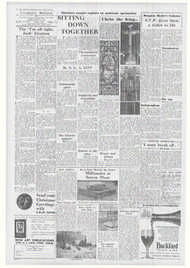Page 6, 23rd October 1959
Page 6

Report an error
Noticed an error on this page?If you've noticed an error in this article please click here to report it.
Tags
Share
Related articles
Religious Life At Cambridge
A Letter From Cambridge
Looking Back And Planning Ahead
He Will Talk To
University The Priest And Chaplains The Doctor
Undergraduates on university 'lapses'
By HILARY KNIGHT
I II A V E received
1 several very interesting letters from undergraduates about the leakage problem. This week I shall quote two of them, the first from an Oxford man at Exeter College. the second from a Cambridge man at Trinity. "I may be able to throw some light on your question concerning university leakage in a slightly offbeat way. As a very raw recruit to the Church. I know very few student Catholics and none who have lapsed. But in my three years as an undergraduate I knew a great many Anglo-Calholies. some Of whom did lapse; and since these modelled their spiritual life on ours, I may perhaps profitably draw on their experience.
REACTION
see it is neither wholly intellectual nor wholly emotional. Yet if I was asked to say which factor was the more important I should say intellectual, since it is hostile intellectual environment which triggers off emotional reaction.
"Even so, I must make yet a further qualification. We should not think of a single hostile environment, but rather of a number of different ones corresponding roughly to different faculties, each of which is hermetically sealed off from the rest. "The problem. therefore, is not the same for a classicist as it is for a historian. The PoliticsPhilosophy-Economics man has a third problem and the scientist a fourth. I might even go so far as to distinguish within Natural Science.
"The most fatal Faculty seems to be the above-mentioned P.P.E. and its equivalents. Here the challenge to faith most nearly approaches the intellectual, via linguistic philosophy. "Perhaps the next in order of peril is English, though I suspect much more so at Cambridge, where English is done " scientifically " (i.e. sociologically) than at Oxford, where one gets no further than the Romantics and concentrates on aesthetics and philology.
NATIONAL SERVICE NATIONAL SERVICE
WE should not over look the part played over and above all this by National Service when this comes first. The seeds of apostacy can be emotionally sown there, and yet not come to fruition until university life provides the intellectual justification. It is only with such intellectual justification that the students' position becomes conscious. "Thus a friend of mine studying English, who came from an exemplary American home and was himself an Anglo-Catholic until he went to the university, clearly started on the downward path while still in the army, as the result of sexual experience; but he did not formulate his agnosticism until he obtained the weapons with which to do so in the study of D. H. Lawrence, Lorca and modern social theorists. . . . 'Christians of any sort are so scarce at English universities, and Catholics more so, that—perhaps for the first time—Catholic students find themselves living with people for whom God simply does not matter, has no meaning. is not an issue.' The air they breathe is by turns clinically detached and wildly abandoned; and there arc far too many things to be doing in the short terms provided to spare more than the minimum for their religion. . . ."
BOMBARDMENT BOMBARDMENT
THE second letter, like the first. concentrates on analysing the situation rather than suggesting remedies. "Before one comes up to uni versity one is given some idea, by parents Or friends, of what university life will be like. In addition one has visions of one's own—seeing oneself as a gay, popular young man, a leading light, and yet somehow securing the coveted 'first' as well. .. •
"The entlightenment, or disillusionment, on arrival is staggering. You have been given no idea of the vastness of university life. the possible alternatives of leisure and of constructive social activity, no idea of the intense bombardment which will be directed at your ideals. subtly, or directly by the arguments of people as intelligent or as rational as yourself. " You did not know—especially if coming from the seclusion of school and home without the intervention of National Service — that others could be so sincere in
holding beliefs contrary to your own. . holding beliefs contrary to your own. . " Here the idea you suggested of intellectual respect is verified by the facts Because a man is a professor. a lecturer, perhaps just a gifted undergraduate, you respect him for what he has and is, but you do not sec what he has not and is not. One variation of this blindness in oneself take the forrn of seizing too eagerly on the opportunities for study and knowledge. and thus losing a sense of perspective.
"(IN the other hand,
JOINING SOCIETIES JOINING SOCIETIES
"(IN the other hand,
ker unless your presence at the university has a definite purpose, unless you avail yourself of the opportunities for work (which can be seen as almost vocational. as a duty to God) you will easily be persuaded into activities solely because you feel you would be missing ' university life in its fullness if you did not join in. "In short, I would say that criticism of self and awareness of the lives of others are the major factors in upsetting one's faith. Unfortunately I think that this upset is inevitable at some stage in life. Only by climbing out of our failures do we become good.
"And of course, as a help in climbing out, Catholic societies must do all they can to push themselves to the notice of freshmen before the enthusiasm of other societies catches their allegiance."
I find bath these letters extremely stimulating and helpful as providing .data for our enquiry.
blog comments powered by Disqus









